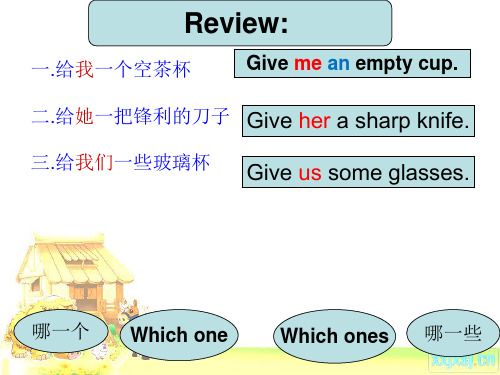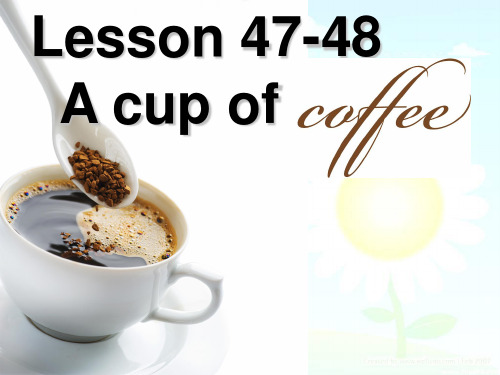新概念第一册lesson
新概念英语第一册Lesson1

新一学习目标1. Standard pronunciation 标准发音2. 2000 words 2000个单词3. Basic grammar knowledge 基本语法知识4. Conversation sentence patterns 交流中常见句型表达新概念英语第一册Lesson 1 Excuse me A:Excuse me! Excuse me!B : Yes?A : Is this your handbag?B : Pardon?A : Is this your handbag?B : Yes , it is. Thank you very much.课程安排I. Warm-upII. ListeningIII. VocabularyIV. Language PointsV. ReviewVI. Culture Tidbits• Vocabularyexcuse v. 原谅(excuse me是对未来的事抱歉;sorry是对过去做错的事道歉)yes adv. 是的handbag n. 女用手提包(单词组成:hand n. 手+bag n. 包;发音技巧:失去爆破)pardon int. 原谅,请再说一遍• Language Points1. 升调的yes:一种询问的语气,也含有让对方继续说下去的意思2. Is this your...? 这是你的…?3. 人称代词的主宾格主谓宾结构:主语+谓语+宾语I love you. 我爱你。
You love me. 你爱我。
I: 主格me: 宾格4. 指示代词this:这,这里句型This is...:这是…5. 陈述句→疑问句This is a car. →Is this a car?①把be动词放在句子的最开头②把陈述句的降调变成疑问句的升调6. 回答Is this...?的提问肯定:Yes, it is.(it is连读)否定:No, it isn't.(isn't=is+not)7. Thank you. 谢谢。
新概念第一册Lesson1完全整理版

新概念第一册Lesson1完全整理版Leon1语音:汉字属于象形文字,具有表义性;英语为拼音文字,具有表音性。
元音字母:aeiou辅音字母:除aeiou以外的字母音素:发音的最小单位,音素的书面表现形式称为音标。
音标共48个,20个元音,28个辅音。
元音是指气流通过口腔时不受到发音器官的任何阻碍,所以发音的时候一定要清晰,畅通。
元音:单元音(前元音、中元音、后元音)、双元音。
前元音:(4个)舌的活动部位在口腔前部。
[i:]舌尖抵下齿,舌前部隆起,接近上齿龈,气流通过缝隙清晰的发出[i:]。
e在开音节中,读[i:],开音节是指以元音结尾的词。
e:me我(宾格)he他he她we我们be系动词ee:bee蜜蜂meet见到treet街道keep保持ee看见ea:eat吃meat肉pleae请read读clean干净的Keepthetreetclean,pleae!请保持街道清洁。
Weeatmeateveryday.我们每天都吃肉。
Shemeetmeinthetreeteveryday.她每天在街上碰见我。
Weeeabee.我们看见一只蜜蜂。
[i]口型比[i:]稍大,嘴唇稍扁,肌肉不要紧张,要松弛一些,短音。
i:it它i是fih鱼mi想念thin瘦的pin别针chip土豆条pig猪闭音节的y(闭音节指以辅音字母结尾的音节)y:gym体育馆pity遗憾city城市Itiathinpig.这是一只瘦猪。
Hemieme.他想我了。
Fihandchiparecheapandeaytoeat.鱼和薯条便宜,吃起来也很方便。
Itiapitythatheiick.她并可,太遗憾了。
Jimiathinaapin.吉姆像个别针一样瘦。
[i:]me我be系动词he他he她[i]it它i是thi这fih鱼[e]口型稍扁,舌位半高半低,短音。
e:get得到beg乞讨never从不let让ret休息wet湿ea:weat汗dead死的bread面包heaven天堂Heidead.他死了Beniwetwithweat.本浑身是汗。
新概念英语第一册Lesson

Where do they e from
It e_s____ from _F_r_a_n_c.e It __e_s__ from ___I_ta.ly
Where do they e m
It e_s____ from _G__e_rm__a_n. y They ___e_ from _____N_o.rway
best best adv. 最
He likes winter best.
wet wet adj. 潮湿的
all in wet 全身湿透了
Her dress is wet.
night nait n. 夜晚
We often sleep at night.
rainy
wet
潮湿的
wet-dry
rise raiz v. 升起 sunrise 太阳升起 set set v. 太阳 落下去 sunset 太阳落下
JIM:
The weather's often cold in the North and windy in the East.
表示一个国家或地区的方位词如果单独使 用一般要大写,但仅仅表示方位意义的方位 词不需大写。
如:a north wind、a south window等。
in the north:在北方
Ireland 爱尔兰
north
west
east
south
England the Great Britain and Northern Ireland
Scotland England Welsh Northern Ireland
英国气候特点
英国处于欧洲西部,大西洋东岸,为典型的温带海洋性气候。 成 因:一方面受中纬度西风 即盛行西风 影响下,常年温和多雨。 另一方面与流经此处的北大西洋暖流也有关系。暖流能对沿岸 起到增温增湿的作用。 英国全国一月份的平均气温约为4至7度 ,七月份13至17度。年降雨量西北部山区超过1000毫米,而东南 部在六七百毫米之间。英国雾气较重,主要是岛国的潮气所致。 首都伦敦冬季河湖极少结冰,一月平均气温在4度 摄氏 以上; 夏天则相当凉爽,七月的平均气温17度,早晚外出需加外衣。年 降雨量约600毫米,雨量分布较均匀。至于伦敦过去常见的浓雾, 并不完全是自然现象。由于重视环境保护,伦敦目前出现浓雾的 次数已大大减少。 英国虽然气候温和,但天气多变。一日之内, 时晴时雨。多变的天气也为人们提供了经常的话题,在英国甚至 最沉默寡言的人也喜欢谈论天气。 受高纬度的影响,英国昼夜 长短的变化特别明显。冬季日短夜长,夏季则日长夜短。夏季是 到英国旅游的最佳季节。夏季日间长,活动时间多,而且温度适 中,天气清爽,人的精神也倍感充沛。这个季节尽管也有雨,但一 般不会连绵不断,影响行程。
新概念英语第一册lesson-讲义

• 刚才您在肉店里吗?
• Were you at the butcher's? • 我在蔬菜水果店里。
• I was at the greengrocer's. • 吉米今天怎么样?
• How's Jimmy today? • 上星期他没上学吧?
• Was he absent from school last week?
翻译
• I am going to stay at my mother’s this Friday.
• They are going to stay at her grandfather’s this weekend.
• Absent adj. 缺席的 • Be absent from 不在,缺席 • Be absent from school 缺课 • Be absent from work 旷工
新概念英语第一册lesson
精品jing
Part one
• Guess • What’s the meaning? • Like, enjoy
Part one
• One part of your body
Part one
• The place where students study and learn
5分钟烧开
Proverbs
A prime minister's heart is big enough to sail a boat in.
宰相肚里能撑船
Part three
• Can you count? • 猜数字游戏
33
24
64
Part four
• 绕口令游戏
绕口令游戏
新概念英语第一册Lesson139~144课文翻译及学习笔记

【导语】新概念英语作为家喻户晓的经典之作,它有着全新的教学理念,有趣的课⽂内容及其全⾯的技能训练,为⼴⼤的英语学习者提供帮助!如果你也想学好英语,⼜怎能错过新概念英语?下⾯为您提供了相关内容,希望对您有所帮助!新概念英语第⼀册Lesson139~140课⽂翻译及学习笔记 【课⽂】 GRAHAM TURNER: Is that you, John? JOHN SMITH: Yes, speaking. GRAHAM TURNER: Tell Mary we'll be late for dinner this evening. JOHN SMITH: I'm afraid I don't understand. GRAHAM TURNER: Hasn't Mary told you? She invited Charlotte and me to dinner this evening. I said I would be at your house at six o'clock, but the boss wants me to do some extra work. I'll have to stay at the office. I don't know when I'll finish. Oh, and by the way, my wife wants to know if Mary needs any help. JOHN SMITH: I don't know what you're talking about. GRAHAM TURNER: That is John Smith, isn't it? JOHN SMITH: Yes, I'm John Smith. GRAHAM TURNER: You are John Smith, the engineer, aren't you? JOHN SMITH: That's right. GRAHAM TURNER: You work for the Overseas Engineering Company, don't you? JOHN SMITH: No, I don't. I'm John Smith the telephone engineer and I'm repairing your telephone line. 【课⽂翻译】 格雷厄姆·特纳:是你吗,约翰? 约翰·史密斯:是我,请讲。
新概念英语第一册-Lesson

CAROL: Oh! TOM: What's the matter, Carol? CAROL: Well, you're going to have roast beef and potatoes again tonight!
be going to do something (1)用于指人时,表示正 打算做某事,计划做某事 I am going to paint the bookcase pink. (2)用于指物时,表示可能 性或必然性 Look, it is going to rain. 瞧,快下雨了。
ready adj. 准备好的,完好的 ① adj. 准备就绪的 be ready to do 你准备好走了吗? Are you ready to leave? ② adj. 预先准备好的;立即可得到的 苹果成熟了,马上就可以吃。 The apples are ripe and ready to eat. We must get the house ready for our guests. 我们必须把房子收拾停当,以期我们的客人随时入住。
e.g. I had a haircut yesterday afternoon.
breakfast/’brekfəst/
01
n.早饭
02
at breakfast
03
早餐时,正在进早餐
04
PART 02
have 用法
have译为“有,拥有”
时,它的疑问和否定形式
有两种: 用助动词引导 由have本身引导
Lesson 81 Roast beef and potatoes SAM: Hi, Carol! Where's Tom? CAROL: He's upstairs. He's _______________. CAROL: Tom! TOM: Yes? CAROL: Sam's here. TOM: I'm nearly ready. TOM: Hello, Sam. _______________. SAM: No, thanks, Tom. TOM: _______________. SAM: OK. Thanks.
新概念英语第一册lesson

the room.
There is a bottle _o__n__ the table.
The bottle is _e_m___p_t_y___. There is a cup on the table t_o__o___.
_T_h__e_ cup is __c_l_e_a__n_.
Can you introduce the kitchen
二. 在这个房间里有一把椅子和三张桌 子
There is a chair and three tables in the room.
There be句型遵循就近原则.
There is a red book on my desk.
否定形式: There is a chair in the room. There is not a red book on my desk. There isn’t a chair in the room.
记忆力大比拼
Mrs. Smith’s __k_i_t_c_h__e_n_ is small. There___is____ a refrigerator __in___t_h_e___k_i_tc__h_e__n_____.
_T__h_e__ refrigerator is white.
It is o__n__ the right.
There is……
on the table clean There is a cup on the table. The cup is clean.
There is……
on the floor large There is a box on the floor. The box is large.
新概念英语第一册 课 完整版

third room
Page 96. Exercise A
• 1 The aeroplane is flying ___o_ve_r_the village. • 2 The ship is going _u_n_d_er_the bridge. • 3 The children are swimming _a_cr_o_ss_the river. • 4 Two cats are running __a_lo_n_g_the wall. • 5 The boy is jumping ___of_f _the branch. • 6 The girl is sitting _b_e_tw_e_en_her mother and her
• Do you like coffee, Ann?
•
与
• I do my homework every day.
• 以上两句中的do一样吗?
• I do my homework every day. • 句中的do作实义动词(有实际意义的动词),
表“做”。 • 例: • do exercises 做练习 • do business 做生意 [‘biznis]
Lesson 47-48 A cup of
Kinds of coffee
Black coffee 纯咖啡
Blue Mountain 蓝山咖啡
蓝山咖啡产地牙买加,得名于加勒比海环抱之中的蓝山。酸味、甜味、 苦味均十分调和又有极佳风味及香气, 适合做单品咖啡,宜做中度烘培。蓝山咖啡是世界上最优越的咖啡, 牙买加的天气,地质结构和地势共同提供了理想的场所。
five fifth
5th
six sixth 6th
seven seventh 7th
- 1、下载文档前请自行甄别文档内容的完整性,平台不提供额外的编辑、内容补充、找答案等附加服务。
- 2、"仅部分预览"的文档,不可在线预览部分如存在完整性等问题,可反馈申请退款(可完整预览的文档不适用该条件!)。
- 3、如文档侵犯您的权益,请联系客服反馈,我们会尽快为您处理(人工客服工作时间:9:00-18:30)。
想要做某事 午饭之后 客厅 饭厅 卧室 卫生间 书房 阳台 厨房 厨房杂乱无章。 别弄乱我的头发。 凌乱的房间 铅笔盒
I have already had lunch.
基本结构
过去分词
时间状语
用途: 表示在过去不确定的时间里发生的并与现在有着某种联系的动作。 表示开始于过去并持续到现在的动作。 结构: 肯定形式:主语 + have/ has + 动词的过去分词 否定形式:主语+haven’t (have not)/ hasn’t (has not)+过去分词 疑问句: Have/Has+主语+过去分词
--Get cleaned up! You two are a mess! 收拾一下吧!你们俩 可真邋遢! 2)v. 弄脏,弄乱 --Don’t mess my hair. 别弄乱我 的头发。 --messy adj. 凌乱的
a messy room
pack v. 包装,打包,装箱 --All these books need to be packed into the boxes.所有这些 书都需要打包到那些箱子里。
--leave the door open, please. 3)忘带某物
--I left my umbrella on the bus. 4) n. 假期 --sick leave 病假
我己经 吃过饭 了。
我们一 起去客 厅吧!
房间很乱。
01
我们正在 收拾行李 箱。
02
我们将要 去度假。
03
lettuce [ˈletɪs] 生菜 cabbage 卷心菜 peas 豌豆 bean 豆子 lamb 羊肉 steak 牛排
I’ve already had… She/he has already had… They’ve already had…
Have you had any…? I haven’t had…, I’ve just had…
suitcase n. 手提箱 --pack the suitcase 整理行囊 a pencil case 铅笔盒 a jewelry case 首饰盒 a packing case 包装箱 Let me carry your case for you. 我来帮你提箱子吧。
We are going to leave tomorrow. =We’re leaving tomorrow. 有些动词如:leave, arrive, go, come它们在表示最近的打算、计划 的时候,可以用现在进行时来代替 be going to的形式: 如:I’m coming. He’s arriving tonight.
过去分词:
规则变化怀过去式一样,在词尾加ed,变化规则与过去式的变化规则一样。
原形
过去式
过去分词
-wait
waited
waited
-regret
regretted
regretted
-type
typed
typed
-fly
flied
flied
-empty
emptied
emptied
2) 不规则 变化(过去分词与不规则动词的过去式的形式相同)
原形
过去式
过去分词
-make
made
made
-find
found
found
-spend
spent
spent
3)不规则变化(过去分词与过去式不一样)
原形
过去式
过去分词
-take
took
taken
-speak
spoke
spoken
-sing
sang
sung
4)不规则变化(过去分词,过去式,与动词原形一样)
Has she/he had any … She/he’s already had…
Homework: 1,recite the text of lesson83 and the
new words. 2,do the exercises (lesson83-84一 课一练)
---cut cut cut
put put put let let let
与现在完成时连用的时间状语: --already 己经(一般用于肯定句中,在表惊讶语气时也用于疑问句中) --yet 还(用于否定句和疑问句中) --just 刚刚 --recently 最近/ so far 到目前为止/ for 持续…时间/ since 自从… 注意:现在完成时不与表过去的时间状语连用,如yesterday, ago, last. He has already come here. 他己经来了。 (来的动作发生在过去,但对现在的影响是他己经在这了。) --Her parents have lived in China since 1985. 自从1985年,他的父母就住在中国了。 (“住”这个动作发生在过去,但它并没有结束持续到现在或将来) 一般过去时强调过去某个特定时间发生的动作或存在的状态。 现在完成时表达在过去不确定的时间所发生的动作对现在造成的影响和结果。这个动作也许到现在己经 结束,也许还要继续下去。 三组比较例子: -I had my breakfast at 8:00 this morning. 我今天早上8:00吃的早饭。 (过去的时间今天早8:00吃饭这个动作发生了,强调某个时间发生某个动作) --I have had my breakfast. 我己经吃过早饭了。 (过去不确定的时间里, 发生某个动作,对现在的影响,即吃早饭的动作发生在过去什么时候,对现在 的影响是我己经饱了或我不想再吃饭了。) --He bought a new skirt last week. 他上周买了一条裙子。 (强调上周的某个时间发生了买裙子的这个动 作) --He has bought a new skirt. 他己买了一条新裙子。(强调现在己经有新裙子。) --They lived in that city last year. 他们去年住在那个城市里。(这个动作己经结束了,他们现在 不住在那个城市里。) --They have lived in that city for 10 years. 他们己经住在那个城市里面10年了。(住这个动作未 结束,现在依然住在那个城市)
leave 1) v. 离开
--It’s time for us to leave. --It’s time for sb. to do… 某人该做某事的时 间到了。
--leave a place for another place --离开….动身去….
--The plane leaves Guangzhou for Shanghai at 12:35. --飞机于12时35分自广州飞往上海 2)让某事(某物)处于某种状态(leave +adj.)
dictation
homework
reciting
Lesson 83 Going on holiday
already adv. 己经 (时间副词)
--The teacher was already in the classroom when I arrived. 当我到达的时候,老师己经在教室里了。
--She had already left when I phoned. 我打电话时她早走了。
mess 1) n. 杂乱或乱的状态(通常用单数)
--This kitchen’s a mess! 厨房 杂乱无章。
--You’ve made a mess of the job. 你把工作搞得一团糟。
